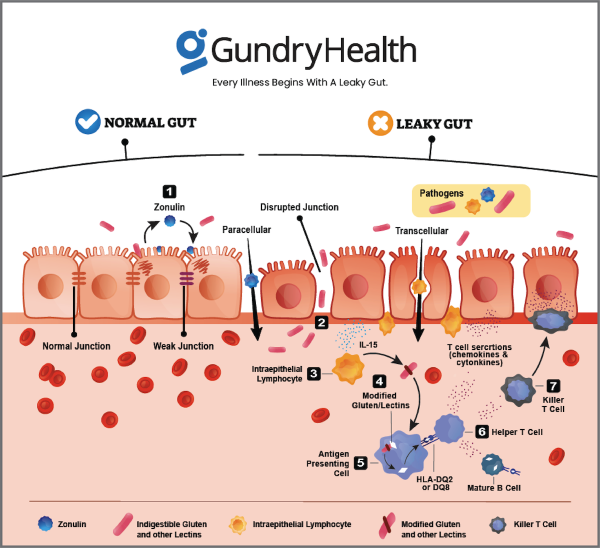Unlocking the Secrets to Clearer Thinking: How to Overcome Brain Fog
Are you feeling unlike yourself and struggling to focus? Brain fog can affect your work, relationships, and overall stability. At Gundry Health, we believe that brain health is essential not only for mental capacity, but also for emotional well-being. Your thoughts and feelings are intertwined, and by optimizing your brain health, you can improve your overall sense of well-being. Our members often seek our help in achieving better mental focus and clarity, and we are here to help you do the same.
Understanding Brain Fog: Symptoms and Signs
Brain fog is a condition that can present itself in different ways. People often describe it as feeling like their brain is filled with cotton candy instead of sharp intellectual tissue. You may find it hard to concentrate on tasks, conversations, or even reading. Simple decisions become more difficult, and you may find yourself needing more caffeine, snacks, or alcohol to temporarily relieve the fog. In severe cases, brain fog can also cause headaches, vision problems, and even nausea. At Gundry Health, we understand the impact of brain fog on overall health and wellbeing, and we are here to help.
Understanding the Causes of Brain Fog and How It Affects You
Brain fog can be caused by a variety of factors such as nutrient deficiency, sleep disorder, bacterial overgrowth, depression, and thyroid condition. Other culprits may include overeating, inactivity, sleep deprivation, chronic stress, and an unhealthy diet. At Gundry Health, these are some of the most common causes of brain fog that we frequently encounter.
How Hormonal Changes Can Affect Your Mental Clarity
Hormonal changes are a natural part of life, and can occur during pregnancy, postpartum, menopause, or due to changes in your lifestyle. These changes can often leave you feeling fuzzy and confused, with one study showing that 60% of women have difficulty concentrating during menopause. Mood swings and changes in sleep habits may contribute to brain fog, but it’s also possible that fluctuating hormone levels are to blame as your body seeks to regain balance. If you are experiencing mental fuzziness, it is important to understand how hormonal changes could be affecting your cognitive function.
How Poor Sleep Hygiene Causes Brain Fog
Irregular sleep patterns, insufficient sleep, and blue light exposure before bedtime can all disrupt your circadian rhythm, leading to brain fog. Exposure to blue light, in particular, can decrease the hormone melatonin, which is necessary for deep REM sleep. Disrupting your body’s natural detoxification process during the hours of 10pm and 2am can also contribute to fogginess. Additionally, waking up at the wrong time in your sleep cycle can impair cognitive function and leave you feeling tired and foggy throughout the day. To ensure you get a good night’s rest, consider using a sleep tracking app like Sleep Cycle, which sets an alarm to go off at the end of your sleep cycle and prevents mid-sleep disruptions.
How Diet Deficiencies and Food Sensitivities can Cause Brain Fog
Brain fog can be caused by several factors, including vitamin and nutrient deficiencies. For instance, a deficiency in vitamin B12 can cause fatigue and affect the central nervous system, leading to brain fog. Similarly, low levels of vitamin D can impair cognitive function, making it difficult to concentrate. Additionally, food intolerances and sensitivities, such as gluten intolerance, can cause inflammation that leads to cognitive dysfunction. Comprehensive blood work and elimination diets can help identify any nutrient deficiencies or food sensitivities that may be contributing to brain fog. At Gundry Health, we can help you optimize your diet to support brain health and improve overall cognitive function.
Understanding the Impact of Stress on Brain Fog
Chronic stress can take a toll on your body and lead to brain fog. When your body senses stress, it activates the fight-or-flight response, diverting energy away from normal functions and towards the stressor. This can make it difficult to think clearly, leading to mental exhaustion and trouble focusing. Interventions such as meditation, exercise, and dietary changes can help reduce stress and alleviate brain fog over time.
Understanding How Medications Can Contribute to Brain Fog
Medications, both prescription and over-the-counter, can be a cause of brain fog as a side effect. At Gundry Health, we prioritize lifestyle interventions to address underlying issues before turning to medication. However, if medication is necessary, our team of care coordinators can help you determine if your medication is impacting your brain health and work with you to find the right solution. This may involve changing medications or adjusting dosages to minimize brain fog symptoms.
How Depression and Anxiety Impact Mental Clarity
Depression and anxiety can significantly impact your cognitive function, leading to issues with memory, attention, and executive function. Research suggests that both the loss of energy and motivation associated with these mental health conditions and their physiological effects on the brain could contribute to this brain fog. If you are experiencing symptoms of depression or anxiety, it is important to speak with your healthcare provider about your treatment options.
How Thyroid Disorders Can Contribute to Brain Fog: Understanding the Link
Thyroid disorders can cause a range of symptoms including brain fog, fatigue, and mood changes. The thyroid gland produces and releases hormones that regulate several bodily functions, including metabolism and heart rate. When this gland is not functioning properly, it can affect cognitive function and contribute to brain fog. Hashimoto’s thyroiditis, an autoimmune disease, is a common cause of brain fog as it inhibits the production of thyroid hormones and creates an inflammatory state. If you suspect a thyroid issue, talk to your doctor about a comprehensive thyroid test that includes markers such as Free T4, Total T4, Free T3, Reverse T3, anti-TPO antibodies, and anti-thyroglobulin. At Gundry Health, our care coordinators prioritize a comprehensive approach to thyroid health to address the root cause of brain fog and other symptoms.
Heavy Metal Exposure and Brain Fog: What You Need to Know
Heavy metal exposure is a common issue that can lead to brain fog, fatigue, hormone imbalance, and immune dysfunction. Arsenic, mercury, aluminum, lead, thallium, and cesium are some of the most common heavy metals that we encounter in our daily lives. Although limited exposure may not necessarily cause toxicity, chronic and prolonged exposure can have serious health implications. To ensure that your body is free of toxins, it is important to regularly test your blood levels for heavy metals. Additionally, incorporating detox practices like physical activity or sauna sessions can help keep your levels under control and reduce any symptoms. At Gundry Health, we offer comprehensive testing and personalized treatment plans to help you address heavy metal toxicity and restore optimal health.
Gundry Health: How to Get Rid of Brain Fog with Personalized Treatment Plan
At Gundry Health, we believe in uncovering the underlying causes of brain fog and developing personalized treatment plans to resolve it for good. Our care coordinators start by reviewing your complete health history and symptoms, and ordering appropriate lab work to test for issues such as thyroid function and heavy metal levels. With this information, our team creates a tailored health plan to address your brain fog and any other symptoms you may be experiencing. Some of the recommendations our care coordinators and health coaches may make include:
Try Intermittent Fasting to Clear Brain Fog
Intermittent fasting is a popular technique for weight loss, but it can also have neurological benefits that combat brain fog and reduce the risk of neurodegenerative diseases. By giving your digestive system a break and promoting ketogenesis, the process of using stored fat for energy, you can stimulate brain regeneration and mental clarity. However, it’s important to practice intermittent fasting safely and under the guidance of a knowledgeable healthcare provider. At Gundry Health, our care coordinators and coaches can help you optimize your meal timing and contents for improved focus and brain function.
Ways to improve mental clarity: The benefits of exercise
A sedentary lifestyle has been linked to neurodegenerative diseases such as Alzheimer’s dementia and cognitive dysfunction. On the other hand, increased physical activity is associated with sharper mental acuity, better memory, and elevated mood. Exercise releases helpful chemical messengers called cytokines and endorphins, which rejuvenate the brain. Engaging in some type of enjoyable movement every day, such as walking, running, or dancing, can be beneficial for mental clarity. At Gundry Health, we encourage our members to incorporate movement into their daily routine as a natural way to promote brain health.
How to Improve Mental Clarity: Tips for Better Brain Function
Getting rid of brain fog and enhancing your mental clarity can be achieved by making some lifestyle changes. One way to start is by giving your digestive system a rest through intermittent fasting. At Gundry Health, we recommend working with a doctor and coach to ensure safe and effective implementation. Additionally, increasing physical activity can improve brain function and elevate mood, while prioritizing quality sleep is crucial for cognitive abilities. By adopting these tips, you can enhance your mental clarity and productivity.
Natural Ways to Combat Brain Fog – Tips from Gundry Health
Many forms of exercise can contribute to brain fog as they stimulate the sympathetic nervous system, which induces stress. To combat this, it is essential to balance active workouts with activities that flex the parasympathetic nervous system, which helps to calm your body and mind. Yoga and meditation can be a great way to reduce stress levels and clear brain fog. At Gundry Health, we prioritize a holistic approach to health that incorporates mind and body wellness.
Ways to Boost Brain Health: Tips from Gundry Health
Your brain needs the right nutrients to function at its best, and a diet rich in healthy fats and protein can help. At Gundry Health, we recommend a plant-based Paleo diet that includes plenty of vegetables, good fats, and enough protein. Omega-3 fatty acids, antioxidants, and essential vitamins and minerals can also boost brain health by reducing inflammation, increasing energy production, and promoting regeneration. By feeding your brain the right way, you can improve mental clarity and reduce brain fog.







